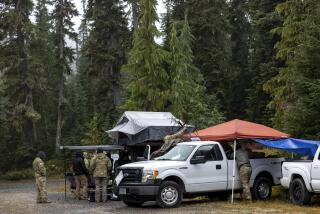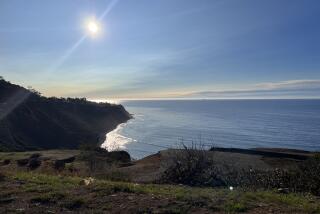Controller’s Parents Died in Plane Crash : Tragedy: Father and mother of woman involved in fatal LAX crash disappeared during a flight nearly 14 years ago. Friends say recent disaster ‘dredges up an old pain.’
For air traffic controller Robin Lee Wascher, the Feb. 1 disaster on Los Angeles International Airport Runway 24-Left--her runway--was “especially tragic” because her parents had died in an aviation accident nearly 14 years ago, friends and co-workers said.
Norman K. and Beverly Jean Wascher vanished June 19, 1977, while flying to Oxnard in their single-engine plane after attending another daughter’s college graduation in Eureka, Calif. The plane has never been found.
The deaths cast a shadow over Robin Wascher’s long interest in flight and became a dominant feature of her life. Before she took the controller position in Los Angeles, Wascher had told a former supervisor that she wanted to return to California and resume the search for her parents.
“She said it was something that she dreamed about from time to time,” said Harry Pelphrey, her former Federal Aviation Administration instructor. “When you can’t finalize something, there’s always a doubt.”
Wascher, an eight-year veteran, authorized a USAir Boeing 737 to land on the same runway she had turned over to a SkyWest commuter plane. The ensuing collision killed 34 people; 67 survived. The controller, who is in seclusion, has told federal investigators that she had confused the SkyWest craft with a similar plane on a nearby taxiway.
The lapse was not typical of the Wascher who is uniformly recalled by neighbors, colleagues and friends as a precise, no-nonsense professional who knew from her parents’ example the terrible price to be paid in aviation accidents.
“It was very traumatic” for Robin and her two sisters, said former brother-in-law James Nuciforo, describing the parents’ fatal accident.
The Los Angeles disaster, he said, “just dredges up an old pain on top of a new one.”
Despite months of searching by air and on horseback through the rugged redwood forests near Eureka, no trace has been found of the Wascher family’s cream-colored Aero Commander 112. Death certificates list the parents’ fate as: “Unknown; airplane disappeared in wilderness--not found.”
The death of Wascher’s parents, not recognized officially until 1987, “devastated” their three grown daughters, said a former neighbor who still resides in the solidly middle-class neighborhood in Thousand Oaks where the family had lived.
Relatives said the uncertainty of the parents’ fate is still discussed occasionally among the sisters--Cherie, 39, Robin, 38, and Heidi, 36.
Robin has spoken of her parents’ death to many of her friends but declined to discuss any details. Friends said the loss of her parents was one of the few troubles borne by the slight but strong woman they described as socially reserved but professionally assertive.
Friends said the Wascher family revolved around her outgoing father, a purchasing agent for Ring Bros. Construction Co. who was remembered by his co-workers as “an awful good man,” an avid fisherman--and “an excellent pilot.” Her mother, who did not work outside the house, was involved in charities and collected turquoise jewelry.
“The girls were very close--very, very close--and they were all close to their dad,” said J. E. Parsons, a friend and president of Ring Bros.
Norman Wascher flew his 1974 Rockwell Aero Commander about once a week for pleasure, said Al Misevic, an Oxnard Airport mechanic who maintained the craft. Wascher owned several other planes before arriving at Oxnard with the Commander, Misevic said.
His middle daughter, Robin, enlisted in the Air Force after graduating from Thousand Oaks High School and attending nearby Moorpark Junior College for one year. In the Air Force, where she attained the rank of sergeant, she first worked as a dental specialist before becoming an air traffic controller.
In 1977, Wascher was in Alaska with her younger sister, driving to her new assignment at Elmendorf Air Force Base outside Anchorage, when their parents’ plane was reported missing, Nuciforo said. It took several days for the sisters to learn of the accident. The Red Cross immediately flew them to California to help in a full-time search for the plane.
Five weeks after her parents’ disappearance, Wascher was discharged from the Air Force. Military records available to the public do not list the type of discharge Wascher received. She rejoined her family’s ongoing search for the plane.
“We sat down and went over Civil Air Patrol reports and scrutinized everything,” Nuciforo said. Hiking through redwood forests and searching on horseback led family and friends only to a number of old, “marked wrecks” from other small-plane crashes.
Darrell Turner of the air patrol in Eureka said he and other searchers assumed that the pilot was disoriented in the thick fog that blanketed the Northern California coast the afternoon of the disappearance. He said a witness in the logging town of Rio Dell reported hearing an airplane in the clouds following the Eel River down toward the ocean.
Rewards totaling $15,000 were offered for recovery of the plane, but the Humboldt County sheriff’s search team and volunteers never found it.
After more than three months, family members called off their search.
But they never forgot.
“It would always come up now and then when we were together” at holidays and other family gatherings, Nuciforo said. By “it,” he said he meant “the possibilities”--but he could only leave the word dangling without elaboration.
In 1982, Robin Wascher enrolled in the FAA academy after thousands of striking civilian air traffic controllers were fired by President Ronald Reagan, breaking their union and opening up new opportunity for women and minorities. She was among the first class of replacement controllers graduated.
Her first field job, in 1982, was in Mississippi, at the Gulfport-Biloxi Regional Airport near Keesler Air Force Base, where she had studied air traffic control in the military. After two years, Wascher moved on to more responsibility at a smaller airport in Greenville, Miss.
Greenville Municipal Airport Director Wayne Downing described Wascher as “a real energetic type person . . . a very clear-speaking, crisp professional.”
Wascher moved to Sardy Field in Aspen, Colo., in 1985. In Aspen, Wascher again established a reputation as a professional devoted to doing things by the book.
When pilots landed after curfew and claimed ignorance or disregarded Wascher’s instructions to call her on the radio from two miles out while approaching to land, she would unflinchingly reprimand them, said a woman who worked at Sardy Field but spoke on condition of anonymity.
Pelphrey, the Greenville airport instructor, remembered Wascher’s talking about resuming the search for her parents when she transferred to Los Angeles in September, 1989. Nuciforo, her former brother-in-law, said the disappearance nagged at Wascher, but, “more than anything, she wanted to get back to her family.”
Wascher evidently adjusted well to the hubbub at the Los Angeles airport, one of the nation’s busiest. She took about a year to reach full-performance level, which means she was fully qualified to work all control-tower positions, including ground-traffic management.
That was her job Feb. 1, directing planes through the maze of runways and taxiways on the north side of the airport after they landed and as they prepared to take off.
That evening, Wascher told National Transportation Safety Board investigators, she radioed permission to a small SkyWest commuter plane to taxi onto Runway 24-L. The SkyWest craft entered the runway 2,400 feet from the end, and she said she never saw it. Instead, she noticed a similar aircraft near the end of the runway and mistook it for the SkyWest plane.
Wascher told officials that she believed that the second plane was stuck in taxiway traffic--a scenario disputed by the pilot of that plane and another pilot--and thus thought the SkyWest plane was unable to act on her order to move into takeoff position. She said she did not see the SkyWest plane taxi onto the runway, so she gave the Boeing 737 jet permission to land.
All 12 people on board the SkyWest Metroliner died in the fiery collision, as did 22 of the 89 passengers and crew on the USAir jet.
Colleagues and friends say Wascher is remorseful and “going through hell.”
More to Read
Sign up for Essential California
The most important California stories and recommendations in your inbox every morning.
You may occasionally receive promotional content from the Los Angeles Times.










